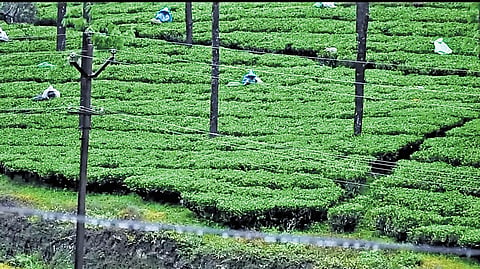

CHENNAI: In the verdant hills of the Western Ghats, where mist clings on to the rolling tea plantations of Mancholai, life has been a delicate balance between the beauty of nature and the harsh realities of labour. For generations, the people here have worked hard in the tea estates, plucking leaves from dawn till dusk, their lives intertwined with the rhythm of the land and the regularity of a government bus that connects them to the outside world. This bus is not just a means of transportation, it is a symbol of unity of a community that has weathered decades of hardship.
But now, the very fabric of this life is under threat. With the 99-year lease period of the Bombay Burmah Trading Corporation Ltd set to end in 2028, the workers of Mancholai face the unsettling reality of eviction. The company has already begun offering voluntary retirement schemes (VRS) as a precursor to displacing these workers from the only home they have ever known. In a place where mobile networks barely function and the connection to the wider world is tenuous at best, the government bus becomes the thread that holds their existence together. This is the backdrop against which the documentary ‘Mancholai’ unfolds.
Directed by Samuvel Arputharaj, known as Sam, ‘Mancholai’ is an exploration of the lives of these tea plantation workers, their struggles, and the community’s emotional connection to the government bus. “My grandfather’s father was the first to go to Mancholai. My relatives are still there,” Sam says, his voice mixed with nostalgia and urgency. “I didn’t start the documentary because of the Mancholai Massacre. It began as an academic project, documenting the life around the bus. But as we delved deeper, the focus shifted to the pressing issues at hand — the impending evictions and the loss of livelihood,” says the student of MGR Government Film and Television Institute. Sam’s connection to Mancholai is personal. Growing up, he visited the estate regularly, his experiences there shaping his understanding of the world and the nature of life in the hills. “The bus is an emotional connection for everyone there. Some days, it may not bring in much revenue, but it’s crucial. It’s the link that keeps the community together,” shares Sam.
The displacement dilemma
As Sam and his friend Sabapathi, began filming in November 2022, they realised that documenting the bus was only part of the story. The narrative soon expanded to encompass the broader struggles of the tea workers, who now face an uncertain future. “In May 2024, they received a VRS notice, and by June 15, they had to decide. Imagine — four generations have lived there, and now, they are being asked to leave in just two months. How is that justice?” Sam asks. He mentions that the company made it seem like the workers themselves have opted for a VRS.
The documentary also highlights the generational impact of this displacement. “Most of the workers only know one job — plucking tea leaves. The next generation is finally breaking free, going to schools, but now they’re being pushed back into the same cycle. It’s heartbreaking.”
Under Che Productions, the documentary will be released on Neelam Social’s YouTube Channel. Direction, camera, editing, and sound design are by Sam. Manjolai Selva Kumar and Sabapathi helped with the camera work. The collaboration with Neelam Social, was unplanned and fortuitous. “We wanted a medium to share this story, and Ranjith Anna suggested releasing it through Neelam,” says Sam. While the documentary’s release date is still undecided, the urgency of its message is clear.
Sam’s approach to filmmaking is rooted in authenticity, driven by his connection to the land and its people. He says, “I didn’t look at other references. This is my story, my family’s story. The technical challenges were there, but we pushed through.”
As ‘Mancholai’ nears completion, the issues it raises are more relevant than ever. The estate workers’ demand for land and housing from the government, their plea for a future beyond the tea plantations, and their fight against an eviction that threatens to erase their community — these are the stories that ‘Mancholai’ brings to the forefront. Sam’s documentary is a reminder that behind the scenic beauty of the hills lies a community struggling for survival.